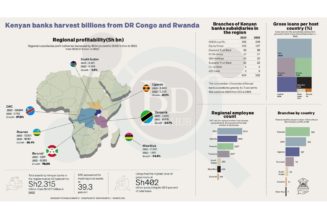Economy
Supreme Court to rule on CS approval of bank rates
Monday February 20 2023
Chief Justice and President of the Supreme Court Martha Koome (centre) and Deputy Chief Justice and Vice-President of the Supreme Court Philomena Mwilu (third left) with Supreme Court Judges (from left) Isaac Lenaola, Dr Smokin Wanjala, Mohamed Ibrahim, Njoki Ndung’u and William Ouko at the Supreme Court Building in Nairobi. FILE PHOTO | JEFF ANGOTE | NMG
The Supreme Court is expected to settle a long-running dispute on whether banks must seek approval from the Treasury Cabinet Secretary before increasing lending rates.
The Court of Appeal judges allowed Stanbic Bank to seek clarity from Kenya’s highest court over section 44 of the Banking Act which requires lenders to seek the approval of the Cabinet Secretary before increasing the rate of banking.
The bank wants the seven-judge court to determine whether the rate of banking is equivalent to lending rates. It holds the position that the rate of banking refers to bank charges like ATM charges, wire transfer fees and account maintenance charges.
The Supreme Court will also decide if section 52 of the Banking Act offers banks the freedom to vary interest rates on the strength of contractual agreements with borrowers without seeking the nod of the Cabinet Secretary.
Read: Banks hit big companies with higher interest rates
Stanbic moved to the Supreme Court after it was asked to refund a manufacturer of sanitary towels, Santowels Ltd, Sh10 million, which rises to Sh90 million when interest is factored in since 2004, for increasing its lending rates with the approval of the Treasury via the Central Bank of Kenya (CBK).
It wants to overturn the refund, fretting that the award will open the floodgates for similar suits that could cost lenders billions of shillings in awards.
The decision of the Supreme will reverberate beyond the outcome of the case, with banks hoping for the freedom to increase lending rates based on market forces and not the wishes of the State or the CBK.
Banks’ loans pricing models require approval by the CBK, and they must justify charging higher rates to customers presenting higher credit risks
Multiple bank executives earlier protested to the International Monetary Fund (IMF) over the CBK’s reluctance to approve lenders’ applications to raise the cost of loans following the scrapping of lending rate controls on November 7, 2019.
So far the CBK has allowed a number of banks to increase the cost of loans based on customer risks, setting the stage for expensive credit for small traders and workers in the informal sector.
In the suit, Stanbic argues that courts have issued different interpretations of section 44 of the Banking Act, with some judges ruling that the Treasury’s nod is not required while increasing lending rates.
“In our view, the interpretation of sections 44 and 52 of the Banking Act transcends the interest of the parties that are before us. A determination of this issue will bring certainty to this question once and for all,” Justices Daniel Musinga, Helen Omondi and Mwaniki Gachoka of the Court of Appeal said in a ruling delivered on Friday.
“We, therefore, grant leave to the applicant to file the intended appeal in the Supreme Court within the next 14 days.”
Section 44 says: “No institution shall increase its rate of banking or other charges except with the prior approval of the minister.”
Section 52 states: “For the avoidance of doubt, no contravention of the provisions of this Act or the Central Bank of Kenya Act (Cap. 491) shall affect or invalidate in any way any contractual obligation between an institution and any other person.”
The Court of Appeal judges said in the ruling that bank customers are also entitled to know whether the signing of agreements amounts to granting banks a blank cheque on the question of interest.
“As we understand it, the applicant [Stanbic] is saying that the courts have given different interpretations on instances when the consent of the minister in charge of finance is required and instances when the parties have freedom of contract to agree on the rate on interest, including the right to vary that rate,” the judges said.
Read: Sharp increase in treasury bill rates signals costly bank loans
A different bench of the Court of Appeal had found that interest charged to Santowels Ltd was above what had been approved through the CBK in 1997, hence illegal.
Justices Hannah Okwengu, Asike-Makhandia and Jamila Mohammed further said the lender charged the interest rates at 19.5 percent instead of 16.5 percent, without the approval of the minister in charge of finance.
The court noted that the bank was aware it required the approval of the minister for any variation or interest adjustments from time to time.
The law was intended to shield consumers from sharp increases in lending rates.
In 2019 November, Kenya ditched the cap on lending rates at 4.0 percentage points above the central bank’s benchmark rate.
The government and the country’s banks blamed the rate cap, imposed in 2016, for curbing private sector lending growth and reducing the effectiveness of the monetary policy.
The cap also had an impact on the wider economy as credit-starved businesses had to lay off staff.
The Supreme Court case comes months after banks started increasing lending rates by up to 1.1 percentage points after the CBK raised its benchmark interest rate by the biggest margin in years, setting the stage for costly credit for homes and businesses in a recovering economy.
The lenders are reacting to the CBK’s decision of September 29 that raised the benchmark interest rate by 75 basis points to 8.25 percent to anchor inflation expectations. The benchmark rate now stands at 8.75 percent.
Banks use a base rate which is normally the cost of funds, plus a margin and a risk premium, to determine how much they charge a particular customer.
They are now reviewing base rates and many have applied to the CBK to revise upwards the risk premium in what could end the era of cheap credit.
The costly credit emerges in a period when the economy is witnessing increased demand for loans amid the recovery from Covid-19 economic hardships, further putting pressure on lending rates.









